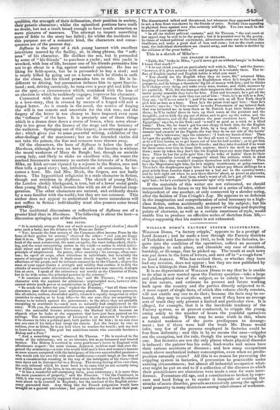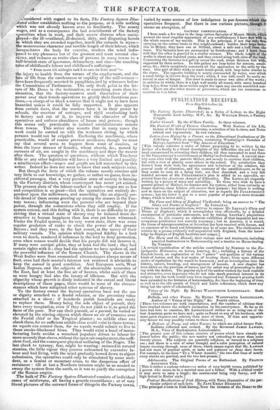WILLIAM DODD'S FACTORY SYSTEM ILLUSTRATED. WILLIAM DODD, "a factory cripple,"
appears to be a protégé of Lord ASHLEY; and he made a tour through the Factory districts of Yorkshire and Lancashire in 1841, to look into the factories, in- quire into the condition of the operatives, collect an account of the cripples in each place, and chronicle any case of accident, hardship, or ill-usage, that he picked up. The result at each town was put down in the form of letters, and sent off in " a rough form" to Lord ASHLEY. Who has revised them, or whether they have had any revision, does not appear ; but they are now published by no less a bibliopole than Joon MURRAY. It is no depreciation of WILLIAM DODD to say that he is unable to do what is now wanted upon the Factory question—take a large and philosophical view of the subject, so as calmly to investigate its true nature, and estimate its present and future working both upon the country and the parties directly subjected to it. A mere report of single facts, of which this volume chiefly consists, will not enable any one to do that ; because the facts may be co- loured, they may be exceptions, and even if they have an average sort of truth they only present a limited and particular view. It is alleged, for example, that it is the inevitable tendency of the Factory system, as at present conducted, to cripple the young, owing solely to the number of hours the youthful operatives are kept standing. There may be some truth in this, where a natural weakness of the parts predisposes to derange- ment ; but if there were halt' the truth Mr. DODD would infer, very few of the persons employed in factories could be free from deformity : and this is by no means the case—cripples are the exception, not the rule, though the average may be a high one. But factories are not the only places where physical disorder is induced : the painter has his colic, lead-works and mines have their various accidents or diseases ; and how many occupations much above mechanical induce consumption, even when no predis- position naturally exists? All this is no reason for preventing the crippling system in factories, if prevention be practicable under existing circumstances; but almost all industrial occupation what- ever might be put an end to if a collection of the diseases to which their practitioners are obnoxious were made a case for state inter- ference. Premature old age, and a constitution so broken by expo- sure and hard living as to render it incapable of resisting. the attacks of acute disorder, prevails as extensively among the agricul- tural peasantry in many districts as among other classes of workmen. onsidered with regard to its facts, The Factory System Plus- either establishes nothing to the purpose, or it tells nothing which was not already known even to familiarity. The scanty / wages, and as a consequence the bad nourishment of the factory rratives when in work, and their severe distress when unem- . oyed—the ill-ventilated, ill-drained, dirty, and disgusting hovels MI which they are crowded together, much like animals in styes— the monotonous character and terrible length of their labour, which incapacitates the body for exercise, renders the mind indis- posed to any pleasures but of the grossest and most sensual cha- r4cter, and reduces an entire class of persons in many towns to a half-brutish state of ignorance, debauchery, and vice—the touching tales of childhood's labour and childhood's sufferings- " From morn till midnight task'd to earn its little meal "- the injury to health from the nature of the employment, and the lois of life from the carelessness or cupidity of the mill-owners- have been frequently asserted in pamphlets, and by witnesses before the Committees of Parliament. The only fresh point in the let- ters of Mr. DODD is the insinuation, or something more than in- sinuation, that the factory-masters avail themselves of their power over their female operatives to gratify their licentious pas- sions,—a charge of so black a nature that it ought not to have been hazarded unless it could be fully supported. It also appears from certain facts, that the masters have it in their power by schools, the erection of cottages, and rigid overlooking both in factory and out of it, to improve the character of their operatives and enforce cleanliness of house and person ; though this seems only practicable in isolated establishments remote from towns. This writer also asserts that in many cases the work could be carried on with the workmen sitting, by which persons would not be crippled. Enclosing the machinery, where practicable, would of course prevent accidents; though we must say that several seem to happen from want of caution, or from the loose dresses of females, whose shawls, &c., moved by currents of air, are caught in the machinery and draw the wearer after them. The question of questions, without which Ten-hour Bills or any other legislation will have a very limited and possibly a mischievous effect—wages and profits are left untouched by this writer. Indeed he does not seem to know that such subjects exist.
But though the facts of which the volume mostly consists add
very little to our knowledge, we gather, or rather we guess, from in- cidental passages, that a very peculiar state of society is forming in the Factory districts, whose counterpart has never yet existed. The present state of the labour-market is such—wages are so low and competition is so great—that the operatives are entirely de- pendent upon the millowners, and something like an abjectly ser- vile dread of them seems growing up among the masses in the Fac- tory towns ; influencing even the persons who are beyond their power, through the connexions whom they still employ. If the system extend, and this feeling with it, there is no difficulty in per- ceiving that a virtual state of slavery may be induced more de- structive to human happiness than has ever yet been witnessed. Under the Feudal system, in its very worst state, there was some regular gradation of ranks to check the power of the greater Barons ; and they were, in the last resort, at the mercy of their military vassals. The opinion which required fidelity to a lord even to death, rendered it infamous in the lord to deny protection, even when reason would decide that his people did not deserve it. If many were ascripti glebe, they at least had the land ; they had certain rights with it ; they had the opinion we have spoken of; and the powerful influence of the Roman Church. The slaves in the West Indies were from economical circumstances always secure of food, even had their master's interest not rendered it advisable to keep the animal in good condition. And European serfs, West Indian Negroes, and the subjects of the abominable tyrannies of the East, had at least the free air of heaven, whilst such of them as were hungry had also the luxury of idleness. But with the oligarchy whose growth is dimly indicated in the casual and literal descriptions of these pages, there would be none of the circum- stances which have mitigated other systems of slavery.
To the factory owner the factory operatives have not the use
or dignity attached to a feudal retainer, or the pecuniary value attached to a slave: if hundreds perish hundreds are ready to replace them. Money being the sole object of pursuit, they have every temptation, even if they do not yield to it, to grind the faces of the poor. Nor can their pursuit, as a pursuit, be varied or elevated by the stirring objects which throw an air of romance over the Feudal chief or the Tropical planter ; no middle class can check them, for no sufficient middle class could exist in those towns; no equals can control them, for no equals would submit to live in those smoke-blackened hives. They would exist a band of manu- facturing lords amidst a wretched populace driven to labour far more severely than slaves, without the open-air employment, the suffi- cient food, and the consequent physical wellbeing of the Negro. The last check to tyranny, fear, might be wanting : reduced in natural
stamina, the little vigour they possess exhausted by excessive la- bour and bad living, with the mind gradually bowed down to abject submission, the operatives could only be stimulated by some acci- dent, as a famine or monetary crisis, to the dangerous effort of resistance : till at last a Northern invasion might be as needed to sweep the system from the earth, as it was to purify the corruption of the Roman empire.
The bulk of The Factory System Illustrated consists of individual cases of misfortune, all having a generic resemblance ; or of very literal pictures of the outward forms of things in the Factory towns,
varied by some scenes of low indulgence in pot-houses which the operatives frequent. But there is one curious picture, though it seems an exception, of
FACTORY FORTIFICATION.
I have made a few trips to the large cotton-factories of Messrs. Strutt, which present the most singular appearance of any establishment I have met with in the whole course of my travels. This is the principal, if not the only firm carrying on the cotton-trade in this neighbourhood ; besides their large facto. ries in Belper, they have one at Milford, about a mile and a half from the town. The factories here are surrounded by fortifications; and I have been told that the other is guarded in a similar manner. The whole length of the works is about one hundred yards, and they extend along both sides of the road. Connecting the factories is a gallery across the road, about thirteen feet wide, supported by three arches. In this gallery are loop-holes for cannon, small- arms, &c., which completely command all the approaches to the mills by the road. One part of their works is made bomb-proof, with loop-holes similar to the above. The opposite building is nearly surrounded by water, over which a small bridge is thrown from the road ; which, I was told, could be easily re- moved in case of danger. The river is made to cover two sides of the works ; in addition to which, there is a high wall nearly all round, with many hundred loop-holes, from which those within might fire upon any crowds assembled out- side. There are also other means of protection, which are too numerous to mention in this letter.



























 Previous page
Previous page